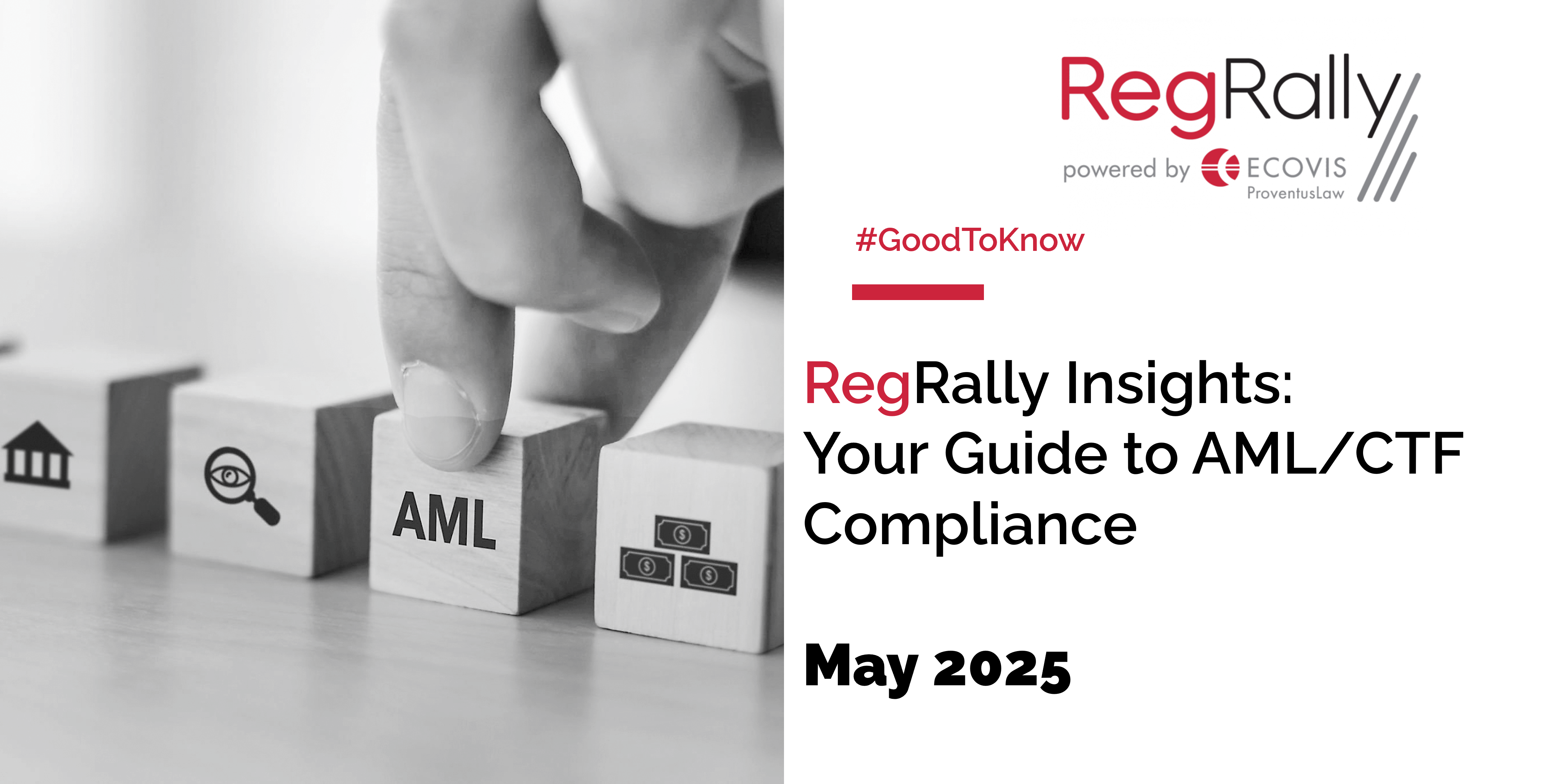ECOVIS welcomes you to its monthly newsletter on Anti-Money Laundering and Counter-Terrorist Financing. It is dedicated to everyone who wants to understand the latest trends and developments, get tips from our experts and deepen their knowledge.
EBA Highlights Key AML/CFT Developments and Crypto-Asset Regulations in Latest Newsletter
In its April 2025 newsletter, the European Banking Authority (EBA) emphasised critical updates in the EU’s anti-money laundering (AML) and counter-financing of terrorism (CFT) frameworks. Notable updates include implementing the EU crypto-asset framework (MiCAR), requiring crypto-asset service providers (CASPs) to adopt robust controls to mitigate illicit risks. The EBA’s collaborative report with ESMA also explored vulnerabilities in decentralized finance (DeFi), including crypto lending, borrowing, and staking risks.
Other developments include the EBA’s continued focus on AML/CFT supervision technology, such as supervisory tech (SupTech) and AI tools, and ongoing efforts to combat de-risking that impacts EU consumers. The EBA is also preparing for the establishment of the new EU Anti-Money Laundering Authority (AMLA), with a focus on compliance improvements and consistency across the EU.
Recommendations for Compliance:
- Align internal policies with the new crypto-asset regulatory framework (MiCAR).
- Integrate updated ML/TF risks related to DeFi, crypto lending, borrowing, and staking.
- Enhance customer due diligence (CDD) measures, especially for high-risk crypto services.
- Prepare for increased scrutiny from national and EU supervisors.
- Adopt AI and SupTech tools for AML/CFT compliance, ensuring data protection.
- Review de-risking practices to ensure access to services is fair and individualized.
- Stay informed on the ongoing transition to the AMLA and future changes in supervisory frameworks.
Bank of Lithuania Imposes €3.5 Million Fine on Revolut for AML Breaches
The Bank of Lithuania (BoL) has fined Revolut €3.5 million following violations of anti-money laundering (AML) regulations. A planned inspection revealed deficiencies in Revolut’s monitoring processes, failing to identify suspicious transactions. Revolut sought to enter into an administrative arrangement with the BoL, which was accepted after the bank acknowledged the issues and demonstrated proactive corrective actions. The fine was based on the scale and duration of the violations, as well as Revolut’s parent company’s annual gross revenue.
Recommendations for Compliance:
- Strengthen systems to ensure the timely identification of suspicious transactions and full adherence to AML regulations.
- Conduct regular internal reviews to identify and address compliance weaknesses.
- Provide ongoing AML training to staff and ensure proper reporting of irregularities.
- Establish clear reporting procedures and foster full cooperation with regulatory authorities.
- Invest in advanced technologies like AI and machine learning to enhance financial crime detection and monitoring.
FCA Updates Guidance on Cash-Based Money Laundering Risks
In April 2025, the Financial Conduct Authority (FCA) updated its guidance on cash-based money laundering, focusing on the significant risks associated with cash deposits, particularly those made through the Post Office. The FCA revealed that hundreds of millions of pounds are laundered annually through this channel. To combat these risks, the FCA has partnered with the National Economic Crime Centre, industry stakeholders, banks, and the Post Office to strengthen anti-money laundering (AML) controls while ensuring that legitimate customers continue to have access to essential cash services.https://www.fca.org.uk/firms/financial-crime/cash-based-money-laundering
SEC Launches Campaign Against Relationship Investment Scams
On 16 April 2025, the U.S. Securities and Exchange Commission’s Office of Investor Education and Advocacy (OIEA) launched a public campaign to raise awareness about relationship investment scams. These scams often involve fraudsters gaining trust through personal or romantic connections before convincing victims to make fraudulent investments. The campaign includes educational videos and online resources to help investors recognize and avoid such schemes. The SEC advises the public to disregard unsolicited messages, be cautious of offers from unknown sources, and report suspected fraud, reinforcing its commitment to safeguarding investors from manipulative financial practices.https://www.sec.gov/newsroom/press-releases/2025-63
OLAF and EPPO Uncover EUR 9.5 Million Fraud Scheme Involving ERDF Resources
The European Anti-Fraud Office (OLAF), in collaboration with the European Public Prosecutor’s Office (EPPO), has uncovered a EUR 9.5 million fraud and money laundering scheme involving the misuse of European Regional Development Fund (ERDF) resources. The investigation, initiated at the request of EPPO, revealed that funds allocated for an IT project in Romania were fraudulently diverted by an organized network spanning Romania, Cyprus, Czechia, and the UAE. Through on-site inspections and operational intelligence, OLAF and EPPO identified twelve defendants, including six individuals and six legal entities, who laundered proceeds via fictitious contracts and suspicious cross-border transactions. Evidence also linked the network to fraudulent practices in a second ERDF-funded project. OLAF has submitted its findings to the European Commission for fund recovery and continues to support the protection of EU financial interests. All persons involved are presumed innocent until proven guilty by a court.


 Newsletter Subscription
Newsletter Subscription